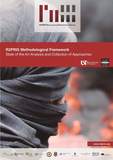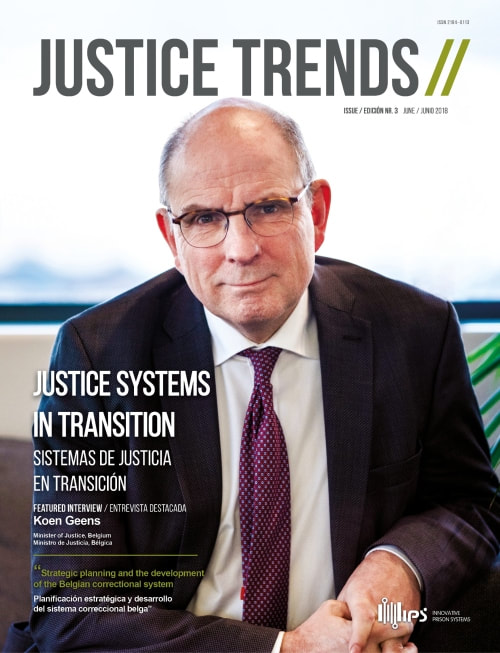R2PRIS methodology, related training and assessment instruments citations
The R2PRIS methodology, related training and assessment instruments has been cited in several official and scientific publications, namely:
- Queensland Corrective Services (2021). Implications of right wing extremism in the corrections system: Prevalence, risks and best practices. Queensland Corrective Services Official Report, Australia, 16 March 2021.
- Fernandez, C., & de Lasala, F. (2021). Risk Assessment in Prisons. RAN Radicalisation Awareness Network. European Commission. Brussels.
- Raudsepp, D. (2020). Radikaliseerumise ja vägivaldse ekstremismi riskinäitajad riskihindamisvahendi komponentidena [Doctoral research, Estonian Academy of Security Sciences]. Estonian Academy of Security Sciences.
- Baaken, T., Korn, J., Ruf, M., & Walkenhorst, D. (2020). Dissecting deradicalization: challenges for theory and practice in Germany. International Journal of Conflict and Violence (IJCV), 14(2), 1-18. DOI: 10.4119/ijcv-3808
- Baaken, T., Korn, J., Ruf, M., & Walkenhorst, D. (2019). Deradicalization in Germany: Challenges for theory and practice. In C. Daase, N. Deitelhoff, & J. Junk (Eds.), Extreme society: What we know about radicalization (pp. 171-210). Frankfurt/New York: Campus Verlag.
- Logvinon, M. (2019). Risk assessment of extremist violence. Risikobewertung extremistischer Gewalt. Wiesbaden: Springer-Verlag.
- Oberg, F. (2019). Mentoring system in the prison care: A process evaluation. Report to the Norwegian Directorate of Criminal Justice at the Justice and Public Security Department. Oslo: KRUS (University College of the Norwegian Correctional Service).
- Van der Heide, L., van der Zwan, M., & van Leyenhorst, M. (2019). The Practitioner’s Guide to the Galaxy-A Comparison of Risk Assessment Tools for Violent Extremism, ICCT Research Paper. DOI: 10.10165/2019.1.07
- Vejvodová, P., & Kolář, O. (2019). Training prison staff to recognize inmate radicalization. Security Journal, 1-13
- Sönmez, G (2019). Turkey’s Fight Against ISIS. Center for Middle Eastern Studies.
- Ronco, D., Sbraccia, A., & Torrente, G. (2019). Prison deradicalization strategies, programmes and risk assessment tools in Europe. European Prison Observatory.
- Dotlačil, F. (2019). Radicalization in Prison: Approaching the Issue [Master’s thesis, Charles University]. Charles University.
- Klima, N. (2018). Overview of the UN counter terrorism architecture. In Strengthening efforts to prevent and counter violent extremism: good practices and lessons learned for a comprehensive approach to rehabilitation and reintegration of VEOs (pp. 11-14). UNICRI.
- Baaken, T., Becker, R., Bjørgo, T., Kiefer, M., Korn, J., Mücke, T., & Walkenhorst, D. (2018). Herausforderung Deradikalisierung: Einsichten aus Wissenschaft und Praxis.
- Černigoj, Š. (2018). Deradikalizacija in probacija v sodobnih družbah: diplomsko delo univerzitetnega študijskega programa Varstvoslovje. (Doctoral dissertation, Univerza v Mariboru, Fakulteta za varnostne vede). Univerza v Mariboru.
- European Commission (2017). State of play of implementing the actions set out in the Commission Communication on supporting the prevention of radicalisation leading to violent extremism to the Communication from the Commission to the European Parliament, the European Council and the Council Eighth progress report towards an effective and genuine Security Union. ANNEX I , page 5. Brussels.
R2PRIS Reports and related documentation
State of the art analysis on violent extremism and radicalisation in the prison environment
|
Part I of the report presents a state of the art analysis on violent extremism and radicalisation in the prison environment, including the concepts, the main general explanatory frameworks, the phases, the pathways and levels of radicalisation, as well as the main indicators on how to identify vulnerable individuals at risk of radicalisation. This is followed by a collection of approaches and practices employed by prison services to tackle the phenomena in the four participating countries in the project: Belgium, Norway, Romania and Turkey. For this purpose, a data collection tool in the form of a survey was developed and deployed. Lastly, in part III, a methodological framework was developed to analyse radicalisation within prisons, based on the desk research findings and on the collected approaches and practices.
Output 1 Final Research Report: "R2PRIS Methodological Framework", January 2017. Download the Report. |
Radicalisation topics published in JUSTICE TRENDS Magazine
|
JUSTICE TRENDS magazine, Issue Nr. 1 (published in June 2017)
JUSTICE TRENDS magazine, Issue Nr. 2 (published in January 2018)
JUSTICE TRENDS magazine, Issue Nr. 3 (published in June 2018)
|
European and International legal Instruments
(Recommendations & Conventions)
|
National Plans & Guidelines
|
Reports & Articles
|
The R2PRIS project is co-financed by ERASMUS + programme ( KA2 - Strategic partnerships for adult education). ERASMUS + is the new EU programme for Education, Training, Youth, and Sports (2014-2020).
This website has been accomplished during the project “Radicalisation Prevention in Prisons” - 2015-1-PT01-KA204-013062 (R2PRIS), implemented with the financial support of the European Commission through the Erasmus + Programme. This publication reflects the views only of the author, The Portuguese National Agency ERASMUS+ Education and Training and the European Commission cannot be held responsible for any use which may be made of the information contained therein. © Developed by IPS_Innovative Prison Systems
|






